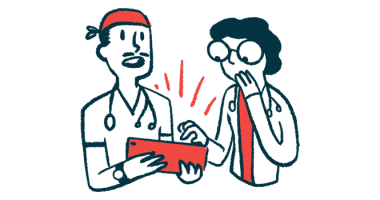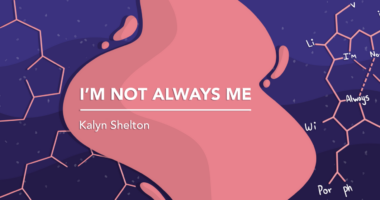I Will Listen to My Body This Holiday Season

The holidays are a tricky time for people living with chronic illnesses like acute hepatic porphyria (AHP). My body doesn’t do well with added stress and anxiety.
I spent Thanksgiving in an acute attack, and didn’t handle it well. I sat down for meals with both sides of the family, even though nausea prevented me from eating. Instead of giving my body the space to rest, I ignored its needs and pushed through.
Leaving my family’s house, I finally surrendered, allowing my body to melt into the passenger seat as my partner drove us home. Almost immediately, sensations and accompanying emotions hit me, as if I had opened the floodgates. I felt disappointment at how I interacted with my family, shame at how I pushed through, and deep, utter exhaustion.
My body was physically there with family, but mentally and emotionally, I missed it all. I turned to my partner and asked, “What just happened?”
***
I dread the holiday season because of my AHP. While brainstorming this column, I talked to a handful of people with chronic illness, who all feel the same way. One friend said clearly communicated boundaries are the only way she can prioritize her health without disappointing her family this time of year.
I have no issues setting boundaries that put my body first. I say no a lot. I don’t feel guilty about flaking. Others understand. My energy is precious and no one else can protect it.
Unfortunately, my struggle lies deeper than that. I have trust issues with my body.
How I’ve ignored my body
I’ve written about how I used dissociation as a coping mechanism during my 19 years of undiagnosed pain. Despite new information from my diagnosis, unlearning decades of bad habits remains a challenge.
AHP is complex and unpredictable day to day, even hour to hour. As a result, it’s been easy for me to question my abilities around the clock. A tough morning doesn’t always lead to a hard afternoon. Sometimes, sleeping in for a few hours contains magical healing powers, and other times, I end up in bed most of the day.
Right away, I discovered that I couldn’t apply the spoon theory, a concept that explains energy limitations using spoons, to my AHP experience. Resting now doesn’t mean I’ll have energy saved for later. I searched for patterns in my symptoms for the first couple of years after diagnosis, hoping to find meaning and associations in my energy levels.
I eventually got so fed up that I stopped trying to predict how I’d feel on a given day. I started making plans without considering my body. Since I ignore its cues like a champ, pushing through symptoms was easy, even as they grew in severity.
Eventually, I crashed and burned. There was no middle ground — I’d either be up interacting with the world, or collapsed in bed, too weak to hold a book.
How I’ve learned to listen
This month, I’m trying something new. And it could be the greatest holiday gift to myself.
I will recognize symptoms as they change. When I note them in my monthly tracker, I will practice feeling accompanying emotions. Simply noting symptoms and how they make me feel, without judgment, will be a profound shift in my self-care. Because then I’ll be able to take the next step: adjusting how I respond, and considering boundaries that make sense for me.
In the moment, I’ve made a habit of tuning out my body’s needs. But later, when the attack is over and I’m left wrecked and grieving, I can look back and hear when it was screaming at me for attention. In hindsight, I can identify each symptom and the action I could’ve taken in response, whether it’s canceling plans or pursuing medical intervention.
Many with chronic illness anticipate a flare during the holiday season, because even the fun variety of stress is hard on us. Many will try to do more than our sore and fatigued bodies can handle. Many will weigh time with family and friends against a body that’s exhausted.
I want to fondly remember this holiday season and the choices I made. I owe it to myself and my loved ones to monitor my health.
***
Note: Porphyria News is strictly a news and information website about the disease. It does not provide medical advice, diagnosis, or treatment. This content is not intended to be a substitute for professional medical advice, diagnosis, or treatment. Always seek the advice of your physician or other qualified health provider with any questions you may have regarding a medical condition. Never disregard professional medical advice or delay in seeking it because of something you have read on this website. The opinions expressed in this column are not those of Porphyria News or its parent company, Bionews, and are intended to spark discussion about issues pertaining to porphyria.








Comments
Leea Winter
I am so blessed to have found your site. I cannot tell you the absolute horror my life has been for. decades having suffered all the acute symptoms of porphyria but never receiving a diagnosis. I've been hospitalized with idiopathic pancreatitis, hyponitrimia (sp), severe debilitating abdominal pain, chronic nausea that kept me on Ondansteron for nearly ten years. severe insomnia, and an array of other symptoms ... including depression and bouts of anxiety. Not knowing what else to do, surgeons removed my gallbladder thinking that might help the symptoms - it did not. And now, just recently, at age 62 ... after decades of indescribable and undiagnosed suffering, I came across the porphyria foundation and your newsletter. I am doing genetic testing now and hope to find a doctor in my state, as I just KNOW that this is the problem ... it is the answer that I've been praying for for so long. If anyone knows of a doctor or where I can go in North Carolina, I'd be eternally grateful. In the meantime, I am so happy and relived to have found this site. Sincerely, Leea Winter